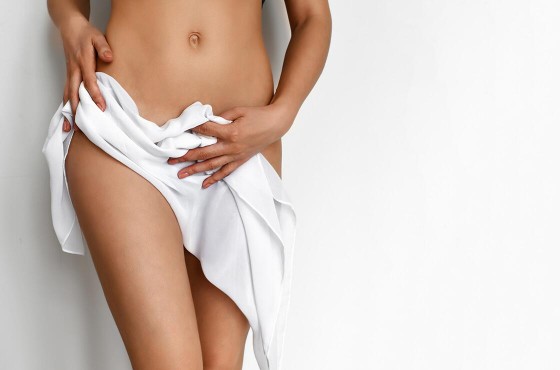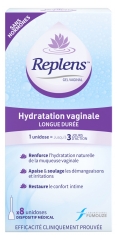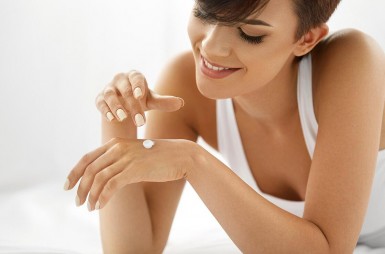An end to intimate dryness
Written by Paul Musset, Doctor in Pharmacy | published on | updated on 14/10/2024

Many women are faced with vaginal discomfort at some point in their lives. Other than fungal infections, this type of discomfort may also be the result of intimate dryness. Why does this occur and what can be done to tackle it? Find out all you need to know about vaginal dryness in this article.
1) What is intimate dryness?
Why does intimate dryness occur?
The key role played by oestrogen
Oestrogen is the primary female hormone that regulates the development of the female sexual organs and the breasts. It ensures that the female reproductive system functions correctly and has a particularly important role to play in relation to ovulation.
This hormone also ensures that the vagina is properly lubricated. This lubrication helps to maintain the balance of the vaginal flora by removing dead cells and other potentially harmful microbes from the vagina.
If there is insufficient lubrication, the vagina becomes dry and more easily irritated, therefore making it more prone to burning sensations and itching. This is what we mean by intimate dryness.
What causes this issue?
A reduction in oestrogen levels is the primary factor in intimate dryness
Once there is a significant reduction in oestrogen in the body, it automatically leads to dryness in the vaginal area. This is when intimate dryness arises.
This decrease in hormones mainly occurs with the menopause. That is why women over the age of 50 are particularly likely to experience vaginal dryness.
However, women may experience a drop in oestrogen at any stage in their lives. This is particularly true during pregnancy when hormonal imbalances are common.
Other causes of vaginal dryness
Other possible causes of vaginal dryness include:
- Certain medications which cause drying of the mucous membranes as a side effect;
- The use of inappropriate cleansing products in the intimate area;
- Excessive chaffing as a result of wearing tight clothing;
- Diseases such as breast cancer.
How can intimate dryness be identified? Symptoms
The main symptoms of intimate dryness are unpleasant sensations in the vaginal area, including:
- Burning;
- Itching;
- Irritation;
- Pain during sexual intercourse.
Vaginal dryness can be diagnosed quickly by a doctor. The condition can be seen in the reduced elasticity of the vaginal tissues, a change in the colour of the vaginal wall and, in the most severe cases, vaginal atrophy.
Potential complications arising from vaginal dryness
The main complication of vaginal dryness is an imbalance in the intimate flora.
The role of the vaginal flora is to protect the vaginal area from harmful bacteria. For this to be effective, the correct balance of flora is essential. If there is an imbalance, pathogenic agents may take over, which can lead to the development of infections such as vaginal thrush.
Vaginal thrush has very similar symptoms to straightforward vaginal dryness. You should consult a doctor if you are unsure about what is causing the problems you are experiencing. This is because vaginal thrush requires appropriate treatment.
Another potential complication is more psychological than physical. Put simply, vaginal dryness can make sexual intercourse more painful and this may have an effect on your relationship.
2) What can be done about vaginal dryness?
Possible treatments
Lubricants
While intimate dryness is not a serious medical condition per se, it is very unpleasant, especially during sex, which may quickly become painful. Lubricants can be used to make up for the lack of lubrication. These mimic the effect of vaginal secretions and lubricate the mucous membranes.
Hormonal treatment
To counteract the reduction in hormones, especially as a consequence of the menopause, women can be prescribed hormone replacements treatments by their doctors. These are available in a range of forms to suit the patient, including patches, pessaries, gels or tablets.
Improving vaginal lubrication through laser treatment
If conventional treatments don’t work or stop working and the vagina is particularly dry, laser treatment can be used to regenerate the cells of the vagina. This procedure removes and replaces the dry mucous membranes with new supple and well-hydrated mucous membranes that produce more secretions and lead to improved natural lubrication.
Natural solutions for intimate dryness
Hormone replacement therapy to alleviate the drop in oestrogen levels is not always well tolerated by certain women who may experience a wide range of side effects, including mood swings, hot flushes and irritability.
Natural solutions to restore your intimate comfort can be chosen instead. These include:
- Food supplements containing borage, evening primrose oil and wheatgerm oil which can increase the skin’s elasticity and suppleness, particularly the mucous membranes.
- Vaginal gels containing active natural ingredients and available in a range of forms, which can improve mucous membrane hydration and maintain suppleness. They are available in single-dose versions, such as Replens vaginal gel or in tubes, such as non-hormonal Mucogyne intimate gel.
Old-fashioned remedies: natural yoghurt
This contains natural fermenting agents that maintain the balance of the vaginal flora. These agents also encourage moisture and therefore help to promote vaginal lubrication.
Advice for preventing vaginal dryness
Alongside topical treatments, here is some advice to promote effective vaginal lubrication and prevent dryness:
- Ensure that your intimate hygiene is appropriate. The mucous membranes in the vaginal area are extremely fragile and require special care afforded by a product specifically designed for that area. It is also important not to wash the intimate area too often, as this can cause irritation and damage the vaginal flora.
- During sex, spend enough time on foreplay to ensure there is effective natural lubrication and therefore prevent irritation.
- Your clothing may be the cause of recurrent vaginal dryness. Choose cotton underwear and avoid tight clothing as this can cause chaffing.
Many women assume that intimate dryness is a fact of life. However, by taking effective preventative measures and using appropriate treatments, every woman can enjoy comfort.
Intimate dryness: three key takeaways:
- The main factor behind intimate dryness is the menopause. However, it is not the only cause and women may find themselves dealing with vaginal dryness for a number of reasons, including stress, inappropriate feminine hygiene products and excessive exercise.
- Intimate dryness is not a foregone conclusion, as there are many ways to alleviate the condition.
- If intimate dryness is not treated using medication or natural remedies, it can lead to physical complications (infection) and psychological difficulties (impact on your intimate relationship).


















